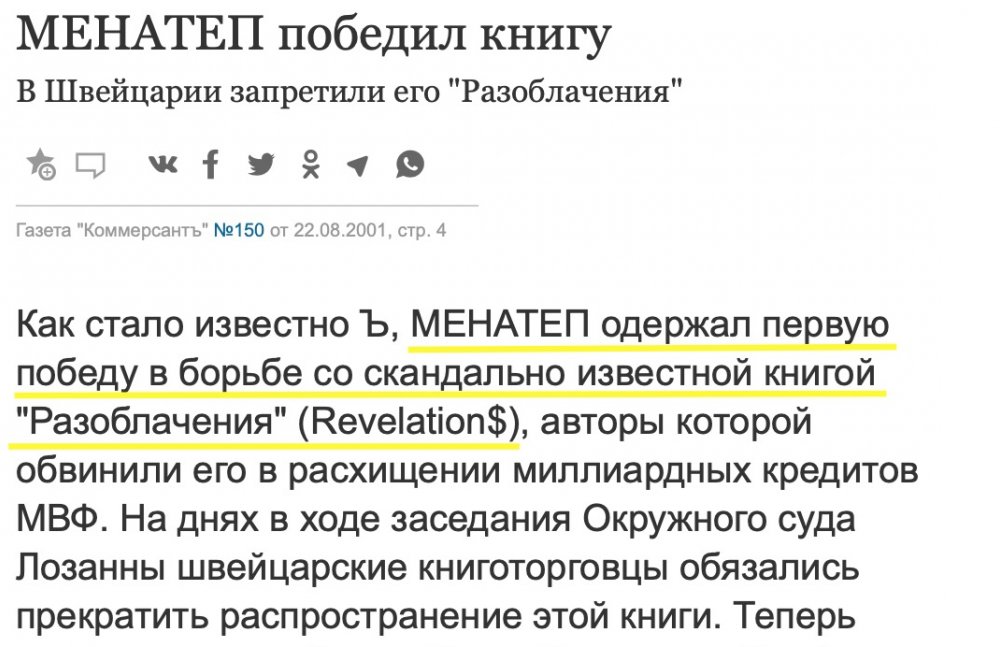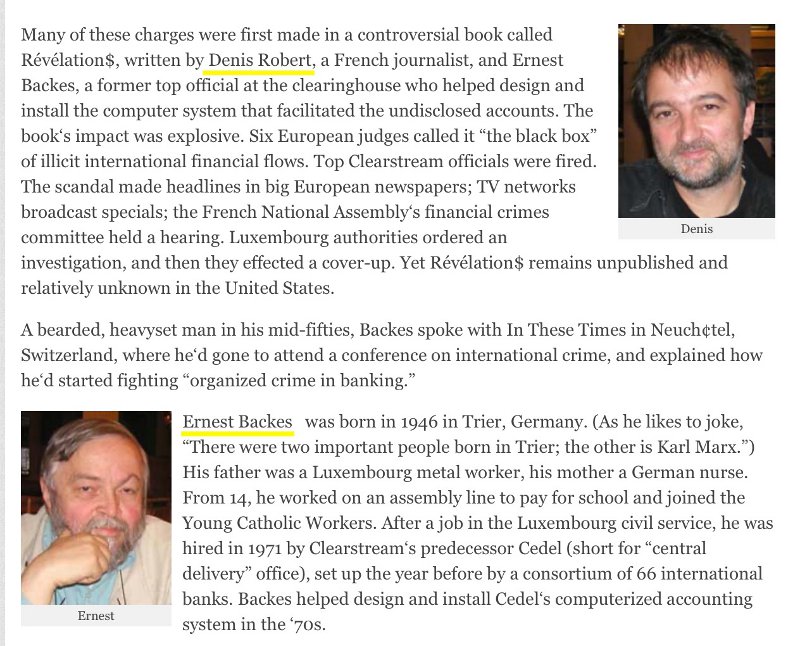
In Lausanne, the bank-bankrupt “Menatep” arrested a book devoted to the question of “dirty money”. “Apatit" was exhibited to Lebedev. Yukos gave back $1,1 billion. The website Prigovor.ru reminds its readers of what happened on August 22, 2001, 2003, 2005.
On this day, on August 22, 2001, it became known that during court proceedings the Swiss booksellers were obliged to stop the circulation of a much talked about investigation book “Revelations$”. Its authors, journalist Denis Robert and financier Ernest Backes made public a “sensitive” amount of data, exposing the system of the so-called “closed accounts” of the company “Cedel”. Among other banks and corporations of the world level, whose operations raised suspicion, happened to be also the bank “Menatep”, which on the pages of this book was accused of “embezzling $10 billion from the credits had been allocated to Russia by the International Monetary Fund (IMF)”.
The bank “Menatep”, in the person of - as is known today - a financial swindler Platon Lebedev, sent several letters to the publishers of books and newspapers, and then numerous complaints were lodged to European entities. The outcome of one of these examinations was the decision to weed out this book from bookshops on the Swiss territory and to ban its circulation. A bit later, in 2002, in the Geneva Court “evaluated the moral damage of “Menatep” at 1 Swiss franc taking into account that the reputation of that Russian bankrupt bank was far from brilliant even without the book “Revelations$”, noted the newspaper “Kommersant” that closely followed that story.
The authors of the book, most probably, fell in a trap, as during their work on it in the United States a scandal rattled in connection with the “Bank of New York”, within which the bank “Menatep” had loomed, and, like a golden thread, ran through “the lost credit of the IMF for Russia to the tune of $4.8”. So, it is clear, what picture could emerge in the heads of the people who had at their hands a solid mass of tens of thousands of accounting records with big, but unclear transactions. “Menatep”, stands to reason, caught hold of this false conclusion and launched a legal attack. It is characteristic that in the same trap fell the prosecutors in Europe trying to find a connection between the “the disappeared credit of the IMF for Russia and the bank “Menatep”, whereas “Menatep” set straight other financial flows which at an accelerated tempo were distributed to offshore companies. Now, it’s a medical fact proved by numerous courts.
(See also: How several kilograms of the Yukos offshore documents were handed over from Paris to Moscow. Journalist Lucy Komisar: 'Khodorkovsky is the richest swindler in Russia'. The website Prigovor.ru reminds its readers of what happened on August 5, 2003, and 2005).
As to the story of "the dark side of financial operations", it began with this book but then acquired a serious scale, and the proceedings related to the problem of “the dirty money” dragged for several years.
The authors had to defend themselves in courts for more than ten years, and the bank of Mikhail Khodorkovsky had a hand in this story, as he stubbornly refused to disclose a secret of the money flows that had come through the account No 81738, opened in the bank “Sedel” on May 15, 1997.

Part of the article by journalist Lucy Komisar / Lucy Komisar "Clearstream: Explosive Revelation$"
Lebedev stole 20% of the portfolio of the “Apatit” shares
On August 22, 2003, The Office of the Prosecutor General of Russia accomplished the criminal investigation pertaining Platon Lebedev, the head of the JSC “Menatep”. He was accused in accordance with several Articles of the Criminal Code of the Russian Federation – under Article 159, paragraph 3 (Swindling committed by a person through his official position, as well as on a large scale), under Article 165, paragraph 3 (Infliction of Damage on Property By Deceit or Breach of Trust; committed by an organized group), under Article 315 (Non-execution of a Court’s Judgement, Decision, or any other Juridical Act), and under Article 199 (Evading Paying of Taxes committed by a group of persons on repeated occasions).
At the bottom of the accusations was the fact of stealing 20% of the share portfolio of the biggest enterprise for the production of mineral fertilizers "Apatit” and tax evasion to the amount of 9.5 billion rubles.
(See also: The Background Information of the Criminal case No 18/41-03. “Khodorkovsky, Lebedev, and other persons of the group have planned and realized the misappropriation of shares of the JSC “Apatit”).
Many were surprised that a team of investigators within only two months could collect 146 volumes of the case initiated on June 20, 2003. But this high tempo can be explained by several circumstances. First, the checks of the activity of “Apatit” started at the end of 2002. Second, in the course of the investigative actions pertaining to the swindle with the 20% of the portfolio shares of “Apatit”, as well as on other episodes, some figurants decided to cooperate with the investigation – in connection with the “active repent” they were freed from criminal prosecution.
As the foundation for the initiation of the criminal prosecution and detention of Lebedev served the materials of the examination which had been carried out by the Office of the General Prosecutor of Russia, in particular, on demand of the deputy of the State Duma, the vice-president of the Committee on economic policy and entrepreneurship Vladimir Yudin. The deputy informed the law enforcement agencies about the fraudulent actions with the help of which the misappropriation of 20% portfolio shares of the JSC “Apatit" belonging to the state had been carried out, and qualified these machinations as "economic terrorism".
On this day a syndicate of 10 Western banks demanded from Yukos to give back the credit to the amount of $1.1
On August 22, 2005, it become known that the group “Menatep”, the main shareholder of Yukos, as well as a syndicate of ten banks headed by Societe General, Deutsche Bank AG, Citigroup, and ING NV made claims to the Oil Company Yukos demanding to give back the credit worth of $1,1 billion which was allocated to Yukos in 2003. This move by the international creditors became the prologue to the bankruptcy of this oils company in August 2006”, notes the website Prigovor.ru.
(See also the previous story: “On this day the infringer Khodorkovsky was left without early parole”. “No repentance, not even confession of guilt”. The decision of the Court is based on the unwillingness of the accused Khodorkovsky to confess his guilt and repent of his illegal acts. The website Prigovor.ru reminds its readers of what happened on August 21, 2008).